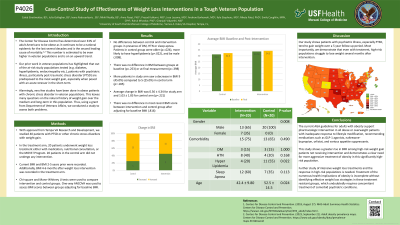Tuesday Poster Session
Category: Obesity
P4026 - Case-Control Study of Effectiveness of Weight Loss Interventions in a Tough Veteran Population
Tuesday, October 24, 2023
10:30 AM - 4:00 PM PT
Location: Exhibit Hall

Has Audio

Caleb Streitmatter, BS
University of South Florida Morsani College of Medicine
Tampa, FL
Presenting Author(s)
Caleb Streitmatter, BS1, Julia E. Gallagher, BA1, Ivana Radosavljevic, BS1, Nikhil Reddy, BS2, Anna Pyayt, PhD3, Prasad Kulkarni, MD4, Jose Lezama, MD5, Andrew Borkowski, MD5, Kyle Stephens, MD5, Niketa Patel, PhD5, Emily Coughlin, MPH, CPH1, Rahul Mhaskar, MPH, PhD1, Gitanjali Vidyarthi, MD5
1University of South Florida Morsani College of Medicine, Tampa, FL; 2University of South Florida Morsani College of Medicine, Allentown, PA; 3University of South Florida, Tampa, FL; 4James A. Haley Veteran's Hospital and USF, Tampa, FL; 5James A. Haley Veteran's Hospital, Tampa, FL
Introduction: The Center for Disease Control has deemed over 42% Americans to be obese as it continues to be a national epidemic for the last several decades and is the second leading cause of mortality. This number is estimated to be even higher in veteran populations and is on an upward trend.
Our prior work in veteran populations has highlighted that out of all at-risk study populations tested (e.g. diabetes, hyperlipidemia, endocrinopathy etc.) patients with psychiatric illness, particularly post-traumatic stress disorder (PTSD), are predisposed to the most weight gain, especially when posed with an acute stressor in short-term.
Alarmingly, despite published guidelines supporting practitioners in treating obesity, very few studies have been done in obese patients with chronic stress disorder in veteran populations; and secondly, the natural history over medium and long-term in this population is unknown. Thus, using a grant from Department of Veterans Affairs, we undertook to study both these problems.
Methods: After obtaining approval from Tampa VA Research and Development, we studied 40 patients with PTSD or other chronic stress disorders with weight gain. In the treatment arm, 20 patients underwent weight loss treatment either with medication, nutritional consultation, or the MOVE! Program. 20 patients in the control arm did not undergo any intervention. Current BMI and BMI 2-5 years prior were recorded. Additionally, BMI 4-6 months after weight loss intervention was recorded in the treatment arm. Chi-square and Mann-Whitney U tests were used to compare intervention and control groups. One-way ANCOVA was used to assess BMI scores between groups adjusting for baseline BMI.
Results: Patients in the study arm had an average change in BMI of 0.56 ± 4.34, while patients in the control group had an average BMI change of 1.03 +/-1.83 from baseline to most recent measurement in last 2-5 years. There was no difference in BMI measurement between groups after adjusting for baseline BMI scores (p=.816).
Discussion: Our study shows patients with psychiatric illness, especially PTSD, tend to gain weight over a 5 year follow up period. Most importantly, we demonstrate that even with treatment, high-risk populations struggle to lose weight several months after intervention. There is a clear need for more aggressive and persistent treatment of obesity, beyond that recommended by current guidelines in this significantly high-risk population, and we are embarking on a more robust treatment paradigm.
Disclosures:
Caleb Streitmatter, BS1, Julia E. Gallagher, BA1, Ivana Radosavljevic, BS1, Nikhil Reddy, BS2, Anna Pyayt, PhD3, Prasad Kulkarni, MD4, Jose Lezama, MD5, Andrew Borkowski, MD5, Kyle Stephens, MD5, Niketa Patel, PhD5, Emily Coughlin, MPH, CPH1, Rahul Mhaskar, MPH, PhD1, Gitanjali Vidyarthi, MD5. P4026 - Case-Control Study of Effectiveness of Weight Loss Interventions in a Tough Veteran Population, ACG 2023 Annual Scientific Meeting Abstracts. Vancouver, BC, Canada: American College of Gastroenterology.
1University of South Florida Morsani College of Medicine, Tampa, FL; 2University of South Florida Morsani College of Medicine, Allentown, PA; 3University of South Florida, Tampa, FL; 4James A. Haley Veteran's Hospital and USF, Tampa, FL; 5James A. Haley Veteran's Hospital, Tampa, FL
Introduction: The Center for Disease Control has deemed over 42% Americans to be obese as it continues to be a national epidemic for the last several decades and is the second leading cause of mortality. This number is estimated to be even higher in veteran populations and is on an upward trend.
Our prior work in veteran populations has highlighted that out of all at-risk study populations tested (e.g. diabetes, hyperlipidemia, endocrinopathy etc.) patients with psychiatric illness, particularly post-traumatic stress disorder (PTSD), are predisposed to the most weight gain, especially when posed with an acute stressor in short-term.
Alarmingly, despite published guidelines supporting practitioners in treating obesity, very few studies have been done in obese patients with chronic stress disorder in veteran populations; and secondly, the natural history over medium and long-term in this population is unknown. Thus, using a grant from Department of Veterans Affairs, we undertook to study both these problems.
Methods: After obtaining approval from Tampa VA Research and Development, we studied 40 patients with PTSD or other chronic stress disorders with weight gain. In the treatment arm, 20 patients underwent weight loss treatment either with medication, nutritional consultation, or the MOVE! Program. 20 patients in the control arm did not undergo any intervention. Current BMI and BMI 2-5 years prior were recorded. Additionally, BMI 4-6 months after weight loss intervention was recorded in the treatment arm. Chi-square and Mann-Whitney U tests were used to compare intervention and control groups. One-way ANCOVA was used to assess BMI scores between groups adjusting for baseline BMI.
Results: Patients in the study arm had an average change in BMI of 0.56 ± 4.34, while patients in the control group had an average BMI change of 1.03 +/-1.83 from baseline to most recent measurement in last 2-5 years. There was no difference in BMI measurement between groups after adjusting for baseline BMI scores (p=.816).
Discussion: Our study shows patients with psychiatric illness, especially PTSD, tend to gain weight over a 5 year follow up period. Most importantly, we demonstrate that even with treatment, high-risk populations struggle to lose weight several months after intervention. There is a clear need for more aggressive and persistent treatment of obesity, beyond that recommended by current guidelines in this significantly high-risk population, and we are embarking on a more robust treatment paradigm.
Disclosures:
Caleb Streitmatter indicated no relevant financial relationships.
Julia Gallagher indicated no relevant financial relationships.
Ivana Radosavljevic indicated no relevant financial relationships.
Nikhil Reddy indicated no relevant financial relationships.
Anna Pyayt indicated no relevant financial relationships.
Prasad Kulkarni indicated no relevant financial relationships.
Jose Lezama indicated no relevant financial relationships.
Andrew Borkowski indicated no relevant financial relationships.
Kyle Stephens indicated no relevant financial relationships.
Niketa Patel indicated no relevant financial relationships.
Emily Coughlin indicated no relevant financial relationships.
Rahul Mhaskar indicated no relevant financial relationships.
Gitanjali Vidyarthi indicated no relevant financial relationships.
Caleb Streitmatter, BS1, Julia E. Gallagher, BA1, Ivana Radosavljevic, BS1, Nikhil Reddy, BS2, Anna Pyayt, PhD3, Prasad Kulkarni, MD4, Jose Lezama, MD5, Andrew Borkowski, MD5, Kyle Stephens, MD5, Niketa Patel, PhD5, Emily Coughlin, MPH, CPH1, Rahul Mhaskar, MPH, PhD1, Gitanjali Vidyarthi, MD5. P4026 - Case-Control Study of Effectiveness of Weight Loss Interventions in a Tough Veteran Population, ACG 2023 Annual Scientific Meeting Abstracts. Vancouver, BC, Canada: American College of Gastroenterology.
